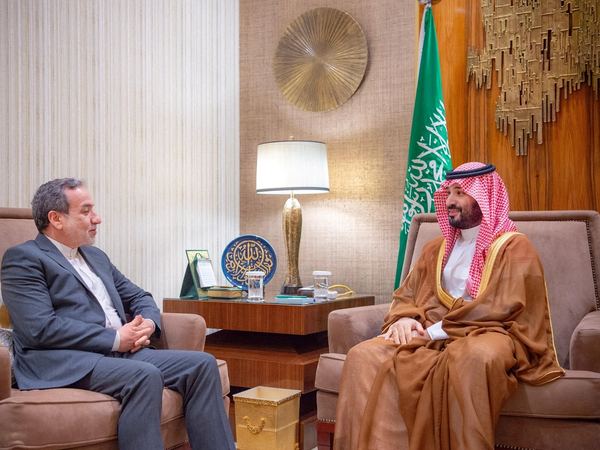The Saudi Crown Prince’s firm call this week for Israel to “cease all hostile actions on Iranian territory” surprised many, sparking questions about what is drawing the longtime rivals closer.
Pundits say besides a mutual wish to help bring the war in Gaza and Lebanon to an end, intertwined security interests play a decisive role in the significant but cautious recent improvement of relations between Shia Iran and Sunni Saudi Arabia.
They say Tehran may be wary of the fact that Donald Trump’s presidency and an end to the war in Gaza and Lebanon may push Saudi Arabia forward in the path of joining the Abraham Pact and normalizing its relations with Israel.
The United Arab Emirates (UAE) and Bahrain, which broke its diplomatic relations with Tehran in 2016, have already established normal diplomatic relations with Tel Aviv.
This, they believe, can completely isolate Tehran in the region at a time when sanctions have drastically damaged its economy and the threat of an all-out war with Israel hangs over its head.
“Trump’s foreign policy regarding the Persian Gulf region [during his first term] was generally giving carte blanche to Saudi Arabia and Israel while conducting a ‘maximum pressure’ campaign against Iran,” Javad Heiran-Nia, director of Persian Gulf Studies at the Center for Scientific Research and Middle East Strategic Studies, wrote Tuesday in an article published by the Iranian think-tank.
This situation, he said, could entail a US-led military coalition with Israel and Persian Gulf Arab countries to be formed. “In response, Iran has been trying to improve its relations with Saudi Arabia, Bahrain, and the United Arab Emirates and prevent a unified US-Israeli-Arab air defense system from forming,” Heiran-Nia wrote, adding that that further convergence of Persian Gulf Arab states with Israel could tip the balance of power against the Islamic Republic and its allies in the region.
Heiran-Nia also argued that realizing that the United States was not going to give it military support against the Islamic Republic, Saudi Arabia wanted to be “a supporter of order in the region rather than a leader” after Iran-backed Houthis’ attack launched rockets and drones on Saudi Aramco’s oil facilities in Jeddah and Riadh, has pushed Saudi Arabia to adjust its policies regarding Iran with less reliance on the United States.
Besides hoping that the Saudis could help to end the war in Gaza and Lebanon to an end, some pundits have also suggested that Iran may be counting on Riadh to play a mediatory role between Tehran and Washington when Trump takes office given the Saudi's traditional good relations with US Republicans and Trump.
“Let’s keep in mind that after the Zionist regime, it is Saudi Arabia that has the most and the strongest lobbies in the power centers of the United States, whether in the Republican Party or among Democrats, and its power of playing a role in improvement or sabotaging relations between Tehran and Washington should not be underestimated,” Persian Gulf region analyst Vahid Pour-Tajrishi wrote in Tahlil-e Bazar Tuesday.
Iran's backing of Shia Houthis has been a thorny issue in Tehran-Riadh relations. Some analysts have pointed out that Riadh, in turn, may be hoping Iran would help end years of conflict with Yemen.
The normalization of Tehran-Riadh relations on political and military levels will have a positive impact on the situation in Yemen alongside the mediatory role that Oman is currently playing between Riadh and Sanaa, journalist and political analyst Salah Al-Saqladi wrote in an article Monday entitled “Saudi-Iranian Military Coordination: What Does This Mean for Yemen” in Rai al-Youm, an Arab world digital news and opinion website.
Political analyst Ruhollah Rahimpour in a tweet Wednesday has also argued that while Iran's state media present Mohammed Bin Salman’s support for Iran as an achievement for the Islamic Republic’s foreign policy, the move helps define a “leading role in the Islamic world” for the de facto Saudi ruler and leaves Iran in his debt to prevent future challenges from Tehran to this role.
Riadh broke its diplomatic relations with Tehran in 2016 when an ultra-hardliner mob attacked and vandalized the Saudi embassy in Tehran and its consulate in Mashhad with Iranian security forces allegedly giving them free reign to burn diplomatic property and documents.
The attack came after Saudi Arabia’s execution of a prominent Shia cleric, Nimr al-Nimr, and the Revolutionary Guards’ promise of “harsh revenge” against the Saudis.
The two countries came nearly to the brink of a war in 2019 following the Houthis attack on Saudi oil facilities.
In 2021, Iraq initiated a mediatory effort to reconcile Tehran and Riadh which led to an agreement in March 2023 to resume their diplomatic relations. The agreement was surprisingly signed not in Baghdad but in Beijing which has deepened its relations, not only with the Islamic Republic, but also with Saudi Arabia in the past few years.
